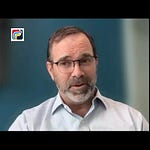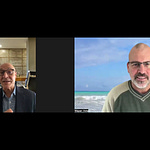How can you get a job in the international social impact sector today? The USAID-financed international development field is shrinking. Philanthropy is coming to the fore in global education or public health. And there are new actors emerging.
Dominic Bond made it clear in a recent conversation that a paycheck with a purpose is still possible.
He is the Director of Social Impact at Inicio Partners, and he shared insights with us about what recruiters are really looking for and how job seekers can stand out in today’s competitive, often unstable, social impact job market.
Dominic has a background as both a nonprofit leader and a recruiter and brings a dual-lens view of the hiring process that every impact-oriented professional needs to hear.
Learn How Executive Search Works
Join us on Tuesday Noon EST to learn how you can be recruited into an awesome senior leadership role. We’ll explore questions like:
Who are the recruiters you should connect with?
How do you go about getting noticed and recruited?
What is the secret to getting hired - or is there one?
Derek Wilkinson, is a Partner at Odgers Berndtson, an executive search firm. He leads the US and Global Public & Not-for-Profit Practice. He will tell you the dark secrets to these dark arts.
What Is the Social Impact Sector?
Social impact work is about addressing some of the inequities, the challenges, the disparities that exist in society.
It spans nonprofits, private philanthropies, foundations, consultancies, and international contractors working on donor-funded programs—especially in sectors like education, health, gender equity, and livelihoods.
Dominic’s particular focus is on international development roles, many of which are tied to funding from major donors and large foundations.
While parts of the sector—especially those linked to US government contracting—are in flux, the broader field of social impact continues to offer meaningful and impactful opportunities for job seekers with the right approach.
What Recruiters Actually Look For Today
If you're looking to get noticed by recruiters like Dominic, you need to highlight three key areas in your public profiles and your discussions with them:
1. Thematic and Geographic Experience
Recruiters want to see evidence of your subject matter expertise—whether it's education, health systems strengthening, governance, or climate adaptation. Just as important is geographic fluency. Show a real understanding of what life is like in different parts of the world. Recruiters are looking for people who grasp the structural challenges facing local communities.
2. Clear Evidence of Impact
Make it obvious what you’ve done and why it mattered. Think about quantifiable aspects of your work in every statement. You should be listing:
Programs you've designed or led - their size and impact
Budgets you've managed - dollar value per year
Teams you've built or overseen - number of people and distribution
Outcomes you've achieved - quantify with numbers!
Don’t just tell them your job description—show your quantifiable contributions and numeric impact in every role.
3. Senior-Level Competency
Recruiters generally focus on executive-level roles: Chief of Party, Thematic Director, Country Manager, etc. These roles demand a mix of people management, thought leadership, and technical credibility.
Be sure to position yourself by showing—not telling—how you achieved all three in previous roles, and therefore will achieve them again in this role.
LinkedIn for Social Impact Job Seekers
LinkedIn is not just for the corporate crowd. Dominic is clear: LinkedIn is your social sector friend too!
There are two powerful ways to use it:
Profile Optimization – Make your achievements searchable. Recruiters are looking for keywords they highlight in job descriptions. You can use Generative AI to find those keywords and use them liberally in your profile. Be sure to optimize your headline, work experience, and skills. I can help if you need it.
Active Networking – Don't just apply to job posts. Instead, connect with professionals inside the organizations you're targeting. Comment thoughtfully on their posts, share insights, and gradually build a relationship. Join us on Thursday to take the ‘ick’ out of LinkedIn Networking - see below.
And if you do reach out to someone at an organization? Use the first-degree message feature. It gets more engagement than sending cold InMails.
The Job Search Trap: Spray and Pray
Dominic sees it all the time: desperate candidates firing off five, ten, even twenty applications a day. His advice? Stop!
“It’s tempting to go after everything that moves, but in such a competitive market, you're competing against people who are the perfect fit, and you will lose.”
Instead of spray and pray, you need to be discerning about the roles you pursue. Please network your way into the organization, before you apply. Then tailor your resume and cover letter to the role, using that inside knowledge from your networking.
Always tell a compelling story. If a cover letter isn’t part of the application process, consider putting a brief 1-paragraph emotional hook at the top of your CV that shows why this particular job matters to you.
As Dominic says:
“Show you’re a compelling storyteller. Reflect your values. Speak to the mission.”
He says you can use ChatGPT as co-author for your resume and cover letter, but not as a copy-paste machine. You need to take the concepts it produces and make them your own.
Are Americans at a Disadvantage Today?
Not necessarily—but be aware of the context. Dominic explains:
For U.S.-based roles, candidates who already have the legal right to work in the U.S. have a clear advantage. Most organizations won’t sponsor visas.
For global roles, salary expectations can be a sticking point. U.S. candidates may find international roles pay significantly less than domestic ones.
That said, if your experience aligns and your salary expectations are flexible, nationality shouldn’t be a major barrier—unless there are legal work eligibility issues in the role’s host country.
Take the ‘Ick’ out of LinkedIn Networking
Networking on LinkedIn can be.. well, icky! You don't want to damage your reputation by doing something wrong, but you want to quickly reach out to people.
Paying Career Pivot subscribers can join us this Thursday to explore questions like:












